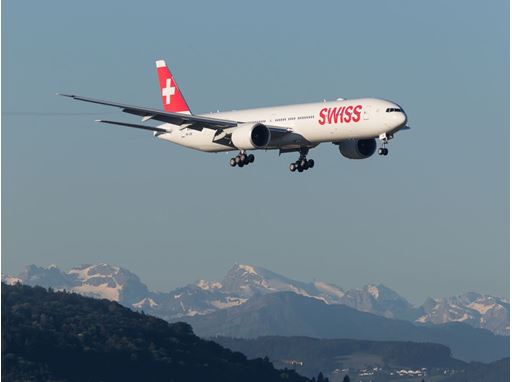Despite sizeable setbacks caused by the Omicron coronavirus variant in the first few weeks of 2022, SWISS was able to substantially improve its operating result year-on-year for the seasonally traditionally weak first quarter. The operating loss for the period was reduced by more than 75 percent to CHF – 47.4 million, while total revenue was more than doubled to CHF 712.0 million. SWISS’s first-quarter performance benefited in particular from the stronger demand for air travel and from the company’s improved cost structures as a result of its restructuring. At the same time, substantially higher fuel prices were among the negative factors. SWISS remains committed to its goal of achieving a ‘black zero’ breakeven earnings result for 2022 as a whole. In view of the positive development in its liquidity situation, the company plans to reschedule its bank loans in the second-quarter period. In addition to ensuring maximum operational stability, strengthening its premium positioning and putting an even firmer emphasis on sustainability remain key SWISS priorities this year.
Although the Omicron coronavirus variant dealt a major blow to the aviation sector’s recovery at the beginning of this year, Swiss International Air Lines (SWISS) was able to substantially improve its operating result for the first quarter of 2022 over its prior-year level. The first-quarter operating loss was reduced by more than 75 per cent to CHF – 47.4 million (Q1 2021: CHF – 201.0 million). Earnings were improved in particular by a tangible increase in demand, which more than doubled total revenue for the period to just under CHF 712.0 million (Q1 2021: CHF 299.6 million). SWISS also continued to work on systematically raising its profitability and lowering its costs under its restructuring programme. Results were burdened, however, by the increase in fuel costs, which is traditionally an airline’s biggest cost item. Demand was also slightly and temporarily weakened by the outbreak of the conflict between Russia and Ukraine. SWISS generated a positive cash flow of more than CHF 200.0 million for the first-quarter period.
Says SWISS CFO Markus Binkert: “The substantial year-on-year improvement that we have achieved in our first-quarter results and our positive cash flow give us confidence, and help us confirm our commitment to posting a ‘black zero’ earnings result for 2022 as a whole.”
Bank loan rescheduling planned
SWISS has further substantially reduced the amount it has drawn from the CHF 1.5 billion bank loan facility which is 85-per-cent guaranteed by the Swiss Confederation over the past three months. As CFO Markus Binkert explains: “With our stable business trends and the positive development of our liquidity situation, we are now in a position to consider financing alternatives to replace the present bank loan facility. And as long as further geopolitical developments permit, we will be looking to reschedule our debt in the course of the second quarter.”
Looking at the positive earnings developments, SWISS CEO Dieter Vranckx adds: “The current trends give us hope that the pandemic has reached a turning point now. We can also clearly see that our restructuring measures are having their effect. That we can now look to the future with confidence again is thanks above all to our employees and all their tireless endeavours.”
Tangible recovery in passenger numbers
SWISS[1] transported more than 1.8 million passengers in the first quarter of 2022, almost six and a half times as many as in the prior-year period. But passenger volumes are still well below their pre-crisis levels of 2019. More than 18,300 flights were operated in the period, four times the number performed a year ago. Systemwide, SWISS offered 156.6 percent more first-quarter capacity year-on-year in available seat-kilometre (ASK) terms. Total traffic volume, measured in revenue passenger-kilometres (RPK), rose 487.3 percent year-on-year over the same period. Systemwide first-quarter seat load factor stood at 62.9 per cent, 35.4 percentage points above its prior-year level.
SWSS continues its transformation
SWISS will be consistently continuing the corporate transformation which it initiated in response to the coronavirus pandemic throughout its 20thanniversary year. Strengthening its premium positioning and putting an even firmer emphasis on sustainability are core elements thereof. First-quarter developments on these fronts included the launch of the new SWISS Premium Economy Class on its Boeing 777-300ER long-haul aircraft fleet. All twelve of SWISS’s Boeing 777s should have the new seating class installed by the end of June. SWISS has also introduced the innovative new ‘Airspace’ cabin concept for its Airbus A320neo family fleet. The new cabin offers customers a tangibly enhanced air travel experience, not least through its greater seating comfort.
SWISS is continuing, too, on its sustainability course towards carbon-neutral flying. The company will be the first passenger airline in the world to adopt the innovative AeroSHARK aircraft skin technology, which should reduce SWISS’s annual carbon dioxide emissions by up to 15,200 tonnes. The first SWISS aircraft should have the special AeroSHARK film applied in the next few months. SWISS and the Lufthansa Group have also embarked on a strategic partnership with Synhelion to bring solar fuels to market. SWISS will be the first airline in the world to use the CO2-neutral sun-to-liquid fuel.
Ensuring maximum operational stability will also remain one of SWISS’s key priorities for the rest of the year ahead.
CEO Dieter Vranckx concludes: “Despite the many uncertainties that are still such a feature of our markets, we are well equipped and well positioned at SWISS to retain our place as one of Europe’s leading airlines.”
Tags: SWISS
